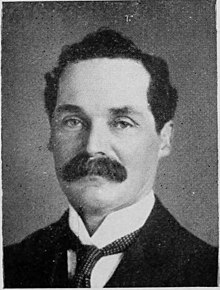William Lamond Allardyce
|
Sir William Lamond Allardyce GCMG |
|
|---|---|
 |
|
| Acting High Commissioner for the Western Pacific | |
|
In office 1901 – 10 September 1902 |
|
| Monarch | Edward VII |
| Preceded by | George Thomas Michael O'Brien |
| Succeeded by | Henry Moore Jackson |
| Acting Governor of Fiji | |
|
In office 1901 – 10 September 1902 |
|
| Monarch | Edward VII |
| Preceded by | George Thomas Michael O'Brien |
| Succeeded by | Henry Moore Jackson |
| 13th Governor of the Falkland Islands | |
|
In office March 1904 – February 1914 |
|
| Monarch |
Edward VII George V |
| Preceded by | William Grey-Wilson |
| Succeeded by | William Douglas Young |
| 48th Governor of the Bahamas | |
|
In office 15 June 1914 – 8 December 1920 |
|
| Monarch | George V |
| Preceded by | Sir George Basil Haddon-Smith |
| Succeeded by | Sir Harry Edward Spiller Cordeaux |
| 13th Governor of Tasmania | |
|
In office 16 April 1920 – 27 January 1922 |
|
| Monarch | George V |
| Preceded by | Sir Francis Newdegate |
| Succeeded by | Sir James O'Grady |
| 5th Governor of Newfoundland | |
|
In office 1 September 1922 – 1 October 1928 |
|
| Monarch | George V |
| Prime Minister |
Richard Squires William Warren Albert Hickman Walter Stanley Monroe Frederick C. Alderdice |
| Preceded by | Charles Alexander Harris |
| Succeeded by | John Middleton |
| Personal details | |
| Born | 14 November 1861 Bombay, Maharashtra, India |
| Died | 10 June 1930 (aged 68) Wokingham, Berkshire, England |
| Spouse(s) | Constance Angel Greene, m.1895, d.1919) Elsie Elizabeth Goodfellow, (nee Stewart, m.1920) |
Sir William Lamond Allardyce GCMG (14 November 1861 – 10 June 1930) was a career British civil servant in the Colonial Office who served as governor of Fiji (1901–1902), the Falkland Islands (1904–1914), Bahamas (1914–1920), Tasmania (1920–1922), and Newfoundland (1922–1928).
Allardyce was born near Bombay, India, the son of Georgina Dickson Abbott and Colonel James Allardyce. Educated in Aberdeen, Scotland and at Oxford Military College, at the age of 18 he joined the British Civil Service in the Colonial Office.
His first posting was Fiji where only two years after arriving there he was named acting Resident Commissioner for the island of Rotuma. The following year as magistrate and seven years later he was appointed to the Native Regulation Board and made the commissioner of the Supreme Court. In 1894 he was made Commissioner for Native Lands and given a seat in the Legislative Council. In 1895 he was appointed Native Commissioner, the chief liaison between the Fijian natives and the British.
In 1904 Allardyce was appointed as Governor of the Falkland Islands. After 10 years at the Falklands he was then transferred to the Bahamas to become its governor. A post he held for six years. Allardyce then became governor of Tasmania, but retired after only two years—taking the last three months as leave—as a result of his failure to obtain an increase in his salary of £2750. In fact a statement made to the Parliament of Tasmania on his salary and allowances was followed by a vote by the Legislative Assembly to abolish his office, although the same motion was defeated in the Legislative Council. Nevertheless, when he left office he was widely praised for his performance of the office.
...
Wikipedia
